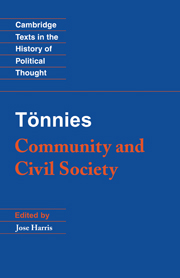Book contents
- Frontmatter
- Contents
- Acknowledgements
- General introduction
- Chronology of Tönnies's life and career
- A note on the texts and further reading
- A note on translation
- Glossary
- COMMUNITY AND CIVIL SOCIETY
- Tönnies's preface to the first edition, 1887
- Book One A general classification of key ideas
- Book Two Natural will and rational will
- Book Three The sociological basis of natural law
- Appendix: Conclusions and future prospects
- Index
- CAMBRIDGE TEXTS IN THE HISTORY OF POLITICAL THOUGHT
Tönnies's preface to the first edition, 1887
Published online by Cambridge University Press: 05 June 2012
- Frontmatter
- Contents
- Acknowledgements
- General introduction
- Chronology of Tönnies's life and career
- A note on the texts and further reading
- A note on translation
- Glossary
- COMMUNITY AND CIVIL SOCIETY
- Tönnies's preface to the first edition, 1887
- Book One A general classification of key ideas
- Book Two Natural will and rational will
- Book Three The sociological basis of natural law
- Appendix: Conclusions and future prospects
- Index
- CAMBRIDGE TEXTS IN THE HISTORY OF POLITICAL THOUGHT
Summary
The conflict between the historical and the rationalistic point of view has in the course of the nineteenth century penetrated into every area of social or cultural studies. It coincides from the outset with the attack of empiricism and critical philosophy on the established system of rationalism as it was exemplified in Germany by the Wolffian school of thought. Coming to terms with these two methods is thus of major significance for my attempt at a new analysis of the fundamental problems of social life.
It is a paradox to say that empiricism, even though it may have carried the day, is also the formal consummation of rationalism. Yet this is nowhere more obvious than in the epistemology of Kant which, while claiming to synthesise the opposing positions, in fact contains equal amounts of modified empiricism and modified rationalism. This admixture had already been evident in the pure empiricism of Hume; for even he does not investigate whether there can in fact be any such thing as universal and necessary knowledge with regard to facts and causality. Instead he deduces the impossibility of such knowledge conceptually, in the same way as Kant later imagined that he could deduce its reality and thus its possibility. Both are proceeding in a rationalistic manner to achieve opposite results.
- Type
- Chapter
- Information
- Tönnies: Community and Civil Society , pp. 3 - 14Publisher: Cambridge University PressPrint publication year: 2001
- 1
- Cited by



